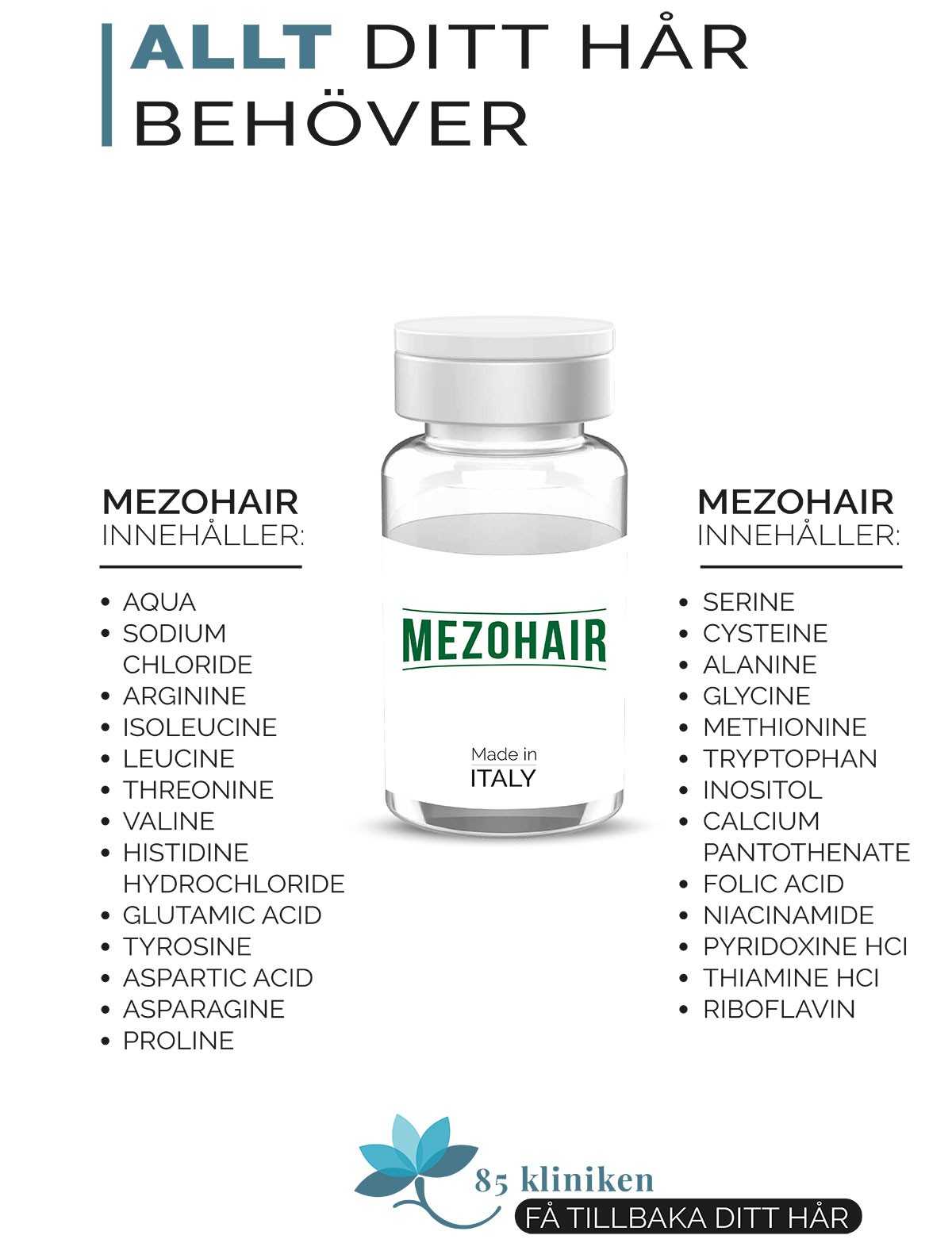Mezohair
Have you experienced thinning hair and PRP hasn’t helped? Are you wondering what you can do about hair loss?
We recommend the most effective method to strengthen and stimulate hair growth: Mezohair.
Hair reflects our overall health and has always been a symbol of beauty, health, strength, and success. However, having thick, healthy hair is not a coincidence. This is because hair growth and volume are not only a perceived reflection of our nutritional and health status, but a reality:
In case of deficiency in any essential nutrient (amino acids, vitamins, or minerals), the body allocates all available micronutrients to fundamental processes required to sustain life. As hair growth is a non-vital function, the body refrains from supporting this process and utilizes available nutrients to maintain others.
Result: Slight deficiencies in certain amino acids, vitamins, or minerals may not initially indicate any problems. However, hair no longer receives the building blocks it needs to grow.
Iron deficiency is easy to recognize: even with iron levels in the blood still considered sufficient according to clinical norms, diffuse hair loss has been observed as an indicator of deficiency. Iron deficiency is especially common in women: 75% of all women between puberty and menopause show iron deficiency.
Hair loss and dry, dull hair are early indicators of nutritional deficiency. Hair loss not only points to iron deficiency but is also an indicator of the absence of other vitamins and amino acids.
Amino Acids: Building Blocks of Hair
Hair consists largely of the sulfur-containing amino acids cysteine and methionine. They help build hair keratin and also bind individual keratin fibers in the hair.
To grow, hair roots (“follicles”) require the two sulfur-containing amino acids, as well as B vitamins, D vitamin, C vitamin, E vitamin, and the minerals iron, zinc, and copper.
-Cysteine: a fundamental building block in hair
Supplementing with cysteine, in combination with pantothenic acid (vitamin B5) and millet seed extract, has been shown to be highly effective for women with diffuse, androgenic alopecia (hair loss).
-Methionine for strong hair and nails
Methionine, the other important sulfur-containing amino acid, forms sulfur chains that make up the basic structure of skin, nails, and most importantly, hair. An Italian study found that methionine intake can promote healthy hair growth.
Arginine and Healthy Hair
Arginine is a semi-essential amino acid that is especially important for circulation. Arginine provides the compound NO (nitric oxide), which signals the small blood vessels to dilate. Only with proper dilation can these blood vessels transport necessary blood and nutrients to the tissues.
Circulation is also important for hair growth, according to a study conducted in 2013.
Vitamins and Minerals to Support Hair Growth
-Iron Deficiency: A Common Cause of Hair Loss
Approximately 75% of all women between puberty and menopause have proven iron deficiency. Even levels of iron that are not considered deficient can lead to excessive hair loss.
Good sources of iron are red meat (beef, pork, or elk), and spinach. Those who do not consume much beef or pork often show low levels of iron. Especially women are recommended to have an iron-rich diet. In some cases of alopecia, supplementing the daily diet with iron may help.
Vitamin E: 50% have a deficiency – Why Mezohair can slow down hair loss
Vitamin E is a fat-soluble vitamin that plays a crucial role in cell integrity and protects sensitive cells in the skin and hair follicles. Approximately 50% of the population, both men and women, do not achieve the minimum recommended daily intake of vitamin E. And this statistic doesn’t only reflect developing countries. Instead, the result reflects the German national consumption study from 2008, a government-sponsored study of 20,000 Germans.
Among other things, a deficiency of vitamin E also results in impaired hair growth. An eight-month study found that vitamin E supplementation increased hair growth by an average of 42% among participants.
Vitamin C
Vitamin C deficiency is also very common in Sweden. In all population groups, about one-third of individuals have a deficiency in vitamin C and do not achieve the recommended daily intake of 80 mg. Vitamin C plays a critical role in keratin synthesis and is therefore an essential factor for healthy hair, skin, and nails.
Biotin
Biotin is a water-soluble B-vitamin. It is particularly important in cell division (mitosis) and in cell metabolism. Symptoms of biotin deficiency include dry skin, alopecia, and baldness.
Zinc
Zinc is one of the most important trace elements as it is involved in more than 200 different metabolic processes. Zinc deficiency causes a range of symptoms, including increased hair loss. Zinc plays a crucial role in keratin formation, the main component of hair, skin, and nails.
Copper
Copper is another mineral critical for hair growth, especially hair color. In case of copper deficiency, hair breaks easily and loses its color and shine. Copper deficiency, just like deficiencies in zinc, iron, or vitamins, can be relatively easily corrected through dietary changes.
Hair Loss During and After Pregnancy
During pregnancy, a woman needs twice as many vitamins and minerals as usual. However, only 20% more energy (carbohydrates and fat) is required. A strict diet consisting of plenty of fruits, vegetables, and lean meats that is not maintained during pregnancy can result in hair loss as a symptom of nutritional deficiency.
During pregnancy, the body continues to prioritize functions according to the principle of highest priority first. The fetus is priority number one, the mother is priority number two. And the mother’s hair comes last.

